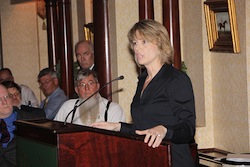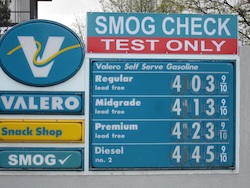 More than 50 American Coalition for Ethanol (ACE) members and ethanol supporters from 15 different states are descending on Washington D.C. tomorrow as part of ACE’s annual fly-in. This year, Executive Vice President, Brian Jennings, said that the group will be playing a bit of offense and a bit of defense when they meet with more than 100 Congressional offices.
More than 50 American Coalition for Ethanol (ACE) members and ethanol supporters from 15 different states are descending on Washington D.C. tomorrow as part of ACE’s annual fly-in. This year, Executive Vice President, Brian Jennings, said that the group will be playing a bit of offense and a bit of defense when they meet with more than 100 Congressional offices.
“When it comes to offense, we’re clearly going to put a lot of emphasis on the need for consumer fuel choice,” said Jennings. “For policies in Washington that relate to ethanol, to deploy more flexible fuel vehicles and more blender pumps, or consumer choice pumps, so motorists have the opportunity and the freedom, if you will, to use these higher blends of ethanol. Because today we simply do not have that critical mass of that infrastructure that we need.”
Jennings said that the group will also be discussing some ideas they have for reforming the ethanol tax incentives. Last year, the Volumetric Ethanol Excise Tax Credit (VEETC) was extended for one year at 45 cents per gallon with the credit going to the blender of record. He noted, “The ethanol industry understands that’s the last extension of VEETC we’re ever going to receive. So if we want any sort of economic incentive to remain in place until we get to that critical mass of FFVs and blender pumps, we’re going to have to significantly reduce the taxpayer cost of that incentive and determine other reforms that focus better on where it needs to go.”
Defensively, Jennings said the group will focus on defending the industry against some bad votes in the House. “You had an amendment that was adopted that was proposed by Congressman Flake of Arizona that would prevent the United States Department of Agriculture from helping to install blender pumps. That’s a problem because later this month USDA is going to announce a grant and loan guarantee program designed to install blender pumps,” said Jennings.
 Another amendment by Sullivan from Oklahoma would restrict the EPA from moving forward to implement the E15 decision. “Those two amendments received strong bi-partisan support in the House,” said Jennings. “Now they’re likely going no where in the Senate but when we meet with members of the House during the fly-in a lot of the emphasis is going to be on setting the record straight regarding the E15 waiver process and all of the science that was used to justify the waiver, and educating members of Congress why a consumer choice pump makes sense.”
Another amendment by Sullivan from Oklahoma would restrict the EPA from moving forward to implement the E15 decision. “Those two amendments received strong bi-partisan support in the House,” said Jennings. “Now they’re likely going no where in the Senate but when we meet with members of the House during the fly-in a lot of the emphasis is going to be on setting the record straight regarding the E15 waiver process and all of the science that was used to justify the waiver, and educating members of Congress why a consumer choice pump makes sense.”
I asked Jennings about the disconnect between current policy makers regarding biofuels and the high prices of gas at the pump – now over $4.00 a gallon in many cities across the country. Jennings said our opponents have unfortunately done a good job of defining the industry and that we have to take that message back – another focus for the grassroots group in D.C. Jennings concluded that “a real, live constituent from a Senator’s state or member of Congress’ legislative district can make such a more compelling and persuasive case to a member of Congress than a paid lobbyist.” And that is why he believes this fly-in is so important.
You can listen to my full interview with Brian Jennings, EVP of ACE, here: Brian Jennings Highlights DC Fly-In

